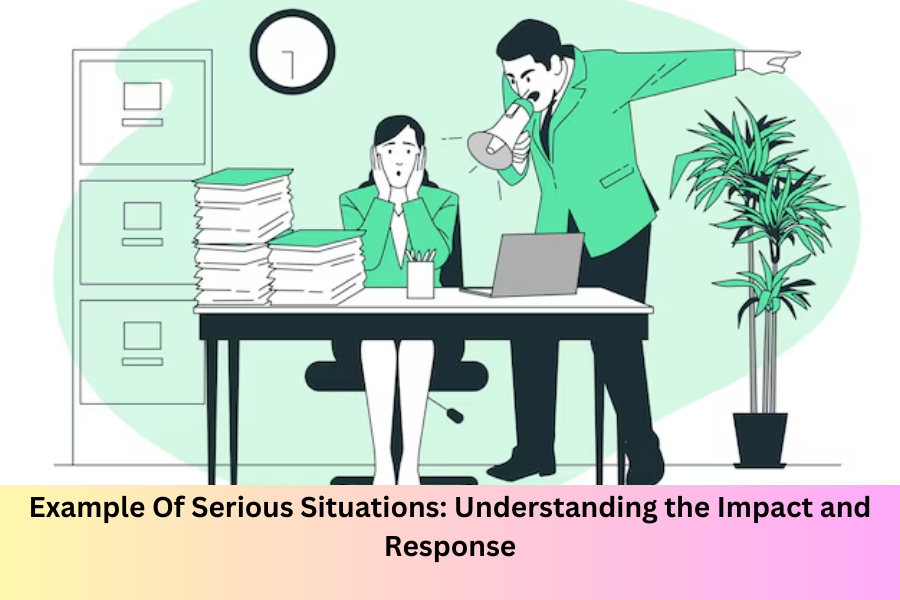Introduction
Life is full of unexpected challenges, some of which demand immediate attention due to their serious nature. These situations, though varied, require quick thinking, often involving professionals or emergency responders, and can have long-lasting impacts. From personal health crises to global humanitarian emergencies, these serious situations span many areas of life and require careful handling to mitigate harm and restore normalcy.
Personal Health Emergencies: A Life-or-Death Matter
Health emergencies are among the most urgent and serious situations an individual can face. Sudden illnesses, injuries, or conditions that affect vital organs often require immediate medical intervention. For example, a heart attack, which occurs when blood flow to the heart is blocked, demands prompt treatment, including CPR or defibrillation, followed by hospitalization for long-term care Similarly, strokes, characterized by the interruption of blood supply to the brain, require rapid action to minimize brain damage.
Another significant health crisis is an allergic reaction, which can escalate quickly into anaphylaxis—a life-threatening condition requiring an immediate injection of epinephrine to open airways and stabilize the person. Allergies to foods like peanuts or shellfish are common causes of such reactions, and understanding symptoms such as swelling, difficulty breathing, and dizziness can make all the difference in saving a life
Mental health emergencies also fall under this category, where conditions such as severe anxiety attacks, suicidal tendencies, or psychotic episodes can endanger an individual’s well-being. In these cases, mental health professionals need to intervene, often involving hospitalization and intensive therapy to ensure safety
Wiki
| Serious Situation | Description | Impact | Response/Action |
| Medical Emergency | A sudden health condition requiring immediate attention, such as a heart attack, stroke, or severe injury. | Immediate risk to life and health, potential for long-term physical or neurological damage. | Call emergency services (911), provide first aid, and seek immediate medical attention. |
| Natural Disaster | A catastrophic event caused by natural forces, like earthquakes, hurricanes, floods, or wildfires. | Destruction of property, loss of life, displacement, environmental damage. | Evacuate affected areas, follow evacuation orders, and seek shelter. |
| Financial Crisis | A situation where an individual or organization faces severe financial distress, such as bankruptcy or job loss. | Economic hardship, loss of savings, damage to credit score, financial instability. | Create a budget, reduce expenses, seek financial counseling, and explore emergency relief options. |
| Workplace Accident | An unexpected event in the workplace causing injury or damage, often due to negligence, lack of safety measures, or human error. | Injury to employees, potential for lawsuits, disruption of work. | Administer first aid, report the accident, and ensure proper safety measures are implemented to prevent recurrence. |
| Mental Health Crisis | A period of severe mental health distress, such as suicidal thoughts, extreme depression, or psychotic episodes. | Emotional and psychological distress, risk of harm to oneself or others. | Seek professional mental health help, offer emotional support, and encourage crisis intervention services. |
| Domestic Violence | Abuse within a household, which may include physical, emotional, or psychological harm, often by a partner or family member. | Long-term physical and emotional trauma, damage to relationships, potential legal consequences. | Contact law enforcement, provide resources for victims, and seek counseling and legal protection. |
| Public Health Crisis | A large-scale health emergency affecting a population, such as a pandemic or widespread outbreak of disease (e.g., COVID-19). | Loss of life, strain on healthcare systems, disruption to daily life, economic downturn. | Follow public health guidelines, social distancing, and vaccination measures; seek medical treatment for affected areas. |
| Civil Unrest | Protests, riots, or violent demonstrations that disrupt social order, often resulting from political, social, or economic dissatisfaction. | Property damage, injuries, loss of life, social and political instability. | Engage in peaceful dialogue, law enforcement intervention, and support community reconciliation efforts. |
| Environmental Hazard | Exposure to toxic substances or pollution, such as chemical spills, air pollution, or water contamination. | Environmental damage, health risks to humans and wildlife, long-term ecological effects. | Evacuate the area, contain the spill, clean up pollution, and mitigate health risks through government intervention. |
| Terrorism or Armed Conflict | Acts of violence intended to create fear or disrupt peace, such as bombings, shootings, or war. | Loss of life, widespread fear, social and economic instability, lasting trauma. | Enforce security measures, engage in diplomatic efforts, and provide humanitarian aid. |
Financial Crises: Immediate Impact on Stability
Another serious situation many individuals and families face is a financial crisis, which can stem from unexpected events such as job loss, large medical bills, or a sudden market crash. The impact of losing a primary source of income can quickly escalate, leading to stress, inability to pay debts, and the potential loss of housing or assets. According to experts, the first step in handling a financial crisis is to assess available resources, like emergency savings, and reduce expenses immediately
A severe Example Of Serious Situations of financial crisis is bankruptcy, which involves legal proceedings in which individuals or businesses unable to meet their debt obligations can be relieved of their debts. While bankruptcy laws vary across jurisdictions, it remains a serious option for those overwhelmed by financial obligations, often requiring professional advice and a careful evaluation of long-term consequences
Natural Disasters: The Power of Nature
Natural disasters, such as earthquakes, floods, hurricanes, and wildfires, are among the most devastating and uncontrollable serious situations. Earthquakes, like the one that hit Nepal in 2015, can cause widespread destruction, killing thousands and leaving millions homeless
Responding to such crises requires swift rescue operations, temporary shelters, and long-term rebuilding efforts.
Floods and hurricanes, such as those caused by Hurricane Katrina in 2005, often displace entire communities, and the long-term effects include disease outbreaks and psychological trauma. The immediate need for water, food, and medical supplies during these times calls for coordinated relief efforts from local governments, humanitarian organizations, and global entities like the United Nations.
Wildfires, often exacerbated by climate change, also pose a significant risk to communities and ecosystems. Recent examples like the 2019–2020 Australian bushfires caused extensive damage, affecting biodiversity and local economies. The response involves firefighting teams, air rescues, and post-fire recovery plans to restore affected areas
Political and Social Crises: International and Domestic Impact
Political instability, wars, and social unrest often lead to humanitarian crises, representing a serious situation on a global scale. Civil wars, like the Syrian conflict, displace millions of people and lead to widespread human rights violations. According to the United Nations, conflicts often disrupt access to food, water, and medical care, exacerbating the suffering of affected populations In such situations, international organizations like the Red Cross, UNHCR, and Médecins Sans Frontières provide essential aid, including food, shelter, and medical care.
Human rights violations during conflict, such as ethnic cleansing or genocide, represent extreme forms of a political crisis. The Rwandan Genocide of 1994 and the Bosnian War in the 1990s serve as tragic examples, where political disagreements escalated into violence, resulting in the loss of countless lives and long-term scars on the affected regions. Addressing such crises often requires diplomatic interventions, peacekeeping missions, and long-term recovery efforts
Legal and Ethical Dilemmas: Navigating Complex Decisions
Serious situations can also arise in the realm of law and ethics, especially when individuals face decisions that affect the lives of others. Legal dilemmas, such as deciding whether to report unethical practices at work, are fraught with risks of retaliation or harm. Whistleblowers, who expose illegal activities within corporations or governments, often face serious consequences like losing their jobs or facing legal action. Such situations require legal counsel and support from advocacy organizations to protect the whistleblower’s rights and ensure that justice is served.
In ethical terms, doctors and healthcare professionals often face situations where they must make difficult decisions regarding life support. For instance, when a patient is in a coma, family members may have to decide whether to continue life-saving treatment or allow nature to take its course. Such decisions are never easy, and they often require careful ethical reflection and consultation with medical teams
Workplace Emergencies: Safety and Protocols
Workplace emergencies, including accidents or hazardous material spills, are serious situations requiring immediate action. For example, when a worker falls from a height or is involved in an industrial accident, medical professionals must be called to the scene immediately to provide first aid and assess whether further treatment is needed. In the case of a chemical spill, evacuation procedures must be enacted to ensure the safety of all employees in the vicinity.
Such emergencies emphasize the importance of workplace safety protocols and the need for proper training and equipment. OSHA (Occupational Safety and Health Administration) standards are designed to minimize risk, but when accidents do occur, swift and well-coordinated responses can save lives and prevent further injury
Domestic Violence: A Hidden Crisis
One of the most serious yet often overlooked situations is domestic violence. This can range from emotional abuse to physical harm, affecting individuals and families across the globe. Domestic violence can be a silent crisis, with victims often fearing retaliation or feeling trapped in the relationship. In these situations, law enforcement, shelters, and legal protection (such as restraining orders) are essential to provide immediate safety and long-term support.
Support groups and counseling are vital for both victims and perpetrators of domestic violence. According to the National Domestic Violence Hotline, an effective response includes a combination of emergency services, legal action, and mental health support
Child Abuse: Protecting the Vulnerable
Child abuse is a grave Example Of Serious Situations, impacting young individuals who are unable to protect themselves. Physical, emotional, or sexual abuse can have long-term effects on a child’s physical and mental health. Social workers, law enforcement, and medical professionals often become involved in these cases to ensure the child’s safety and well-being. Moreover, therapeutic interventions are necessary to help the child heal from trauma and regain a sense of stability and security
Elder Abuse: A Growing Concern
Elder abuse is an increasing concern, as the aging population grows. This form of abuse can be physical, emotional, or financial and often occurs in institutional settings like nursing homes. In many cases, the elderly individual may be unable to communicate their distress, making intervention difficult. Family members, caregivers, and authorities must remain vigilant, recognizing signs of abuse and ensuring that appropriate legal action is taken when necessary
Environmental Disasters: Climate Change and Global Warming
Environmental issues like climate change and global warming are also serious situations that affect the planet on a global scale. Deforestation, melting ice caps, and rising sea levels are just a few examples of how human activities impact natural systems. The consequences of these environmental changes are felt worldwide, from extreme weather events to food shortages and displacement. Governments, NGOs, and international organizations must collaborate to address these pressing environmental challenges through sustainable practices and policies
Domestic Fires: The Hidden Threat
Domestic fires, whether caused by cooking accidents, electrical faults, or negligence, represent a serious situation that often escalates rapidly. In the event of a fire, the first priority is ensuring that everyone is safely evacuated from the premises. Firefighters then take over to contain and extinguish the fire, while medical teams address any injuries or smoke inhalation. Fire safety education and preparedness are key to minimizing loss of life in such situations
Conclusion: Understanding Serious Situations and Their Impact
Serious situations are a part of life that can arise at any time, whether in our personal health, financial well-being, or larger societal and global challenges. These situations require prompt and effective responses to mitigate their effects and ensure safety and recovery. From medical emergencies like heart attacks and strokes to global crises such as wars and natural disasters, each serious situation presents its own set of challenges. Responding swiftly and appropriately is crucial, often requiring the expertise of professionals, be it in healthcare, law enforcement, or disaster relief.
As we navigate these situations, it is essential to recognize the severity of the circumstances and act with urgency. Whether it’s preventing the escalation of a workplace accident, addressing a mental health crisis, or responding to a natural disaster, the way we handle these situations can make all the difference in minimizing harm and aiding recovery. Through awareness, preparation, and support from professional services, we can improve outcomes in the face of such emergencies.
FAQs
1. What is considered a serious situation?
A serious situation refers to any event or condition that has the potential to cause significant harm or disruption. This could include health emergencies, such as a heart attack or stroke; financial crises, such as bankruptcy or job loss; natural disasters like hurricanes or earthquakes; and social issues, such as domestic violence or child abuse.
2. How can I prepare for serious situations?
Preparation for serious situations includes being aware of potential risks in your environment, having emergency plans in place, and knowing how to access necessary resources. For example, having a first-aid kit, learning CPR, and creating a family emergency plan for natural disasters are all important steps in preparedness.
3. How do you respond to a financial crisis?
In response to a financial crisis, the first step is to assess your immediate resources, like savings or assets that can be liquidated. It’s important to create a budget, reduce unnecessary expenses, and seek financial counseling if necessary. In cases of severe debt, consider speaking with a financial advisor about options like bankruptcy or debt restructuring.
4. What should I do in case of a medical emergency?
In a medical emergency, the first action is to assess the situation and call for emergency help (911 or the local emergency number). If safe, provide necessary first aid such as CPR for someone who is unresponsive or controlling bleeding in case of injury. Always follow the guidance of medical professionals and seek immediate care at the nearest hospital.
5. What are the long-term effects of a serious situation?
The long-term effects of a serious situation depend on its nature. Health emergencies may lead to chronic conditions or long recovery periods, while financial crises might result in lasting economic hardship. The psychological effects of trauma, such as from a natural disaster or violence, can also persist and require ongoing mental health support.
6. How can communities help in serious situations?
Communities play a vital role in managing serious situations by providing support, organizing relief efforts, and offering resources like shelter, food, and medical care. In times of crisis, collaboration between local governments, non-profit organizations, and the community can speed up recovery and help mitigate the impact of the situation.
7. What resources are available for people facing serious situations?
There are various resources available depending on the situation. For health emergencies, hospitals and urgent care centers are key. Financial crises may benefit from financial advisory services and bankruptcy attorneys. For natural disasters, local governments and humanitarian organizations like the Red Cross provide vital support. Social services are available for those facing domestic abuse or mental health crises.
Explore the latest news and updates on Play Hop



